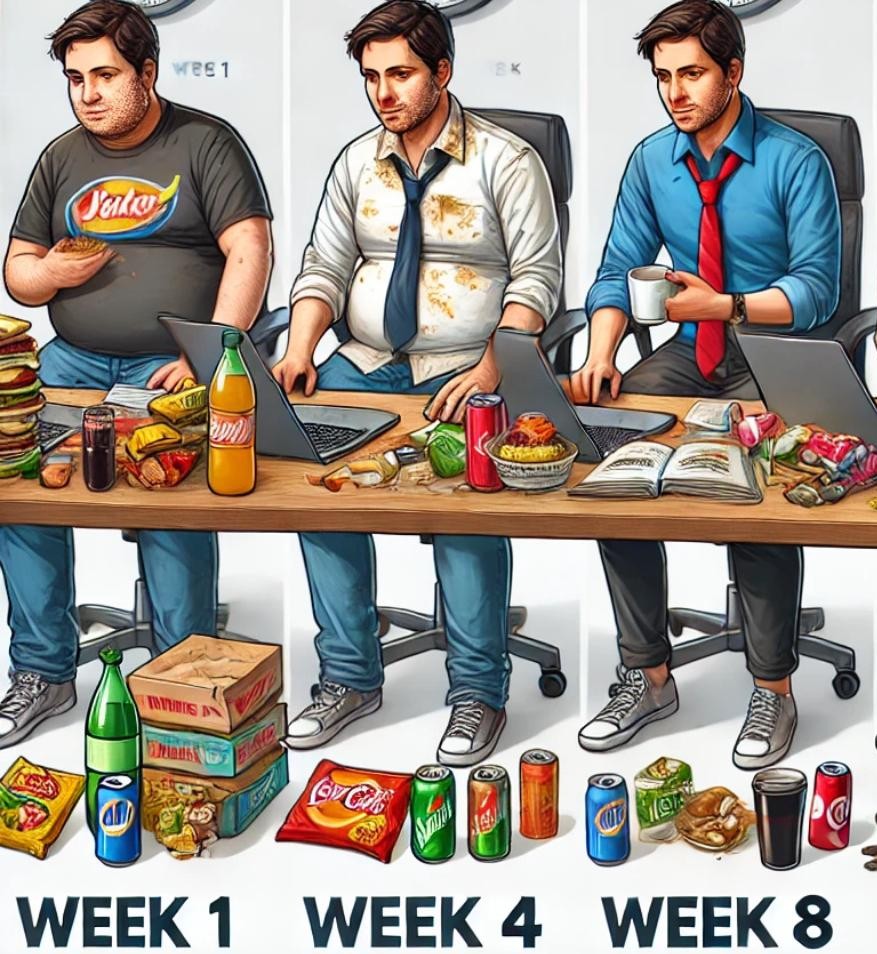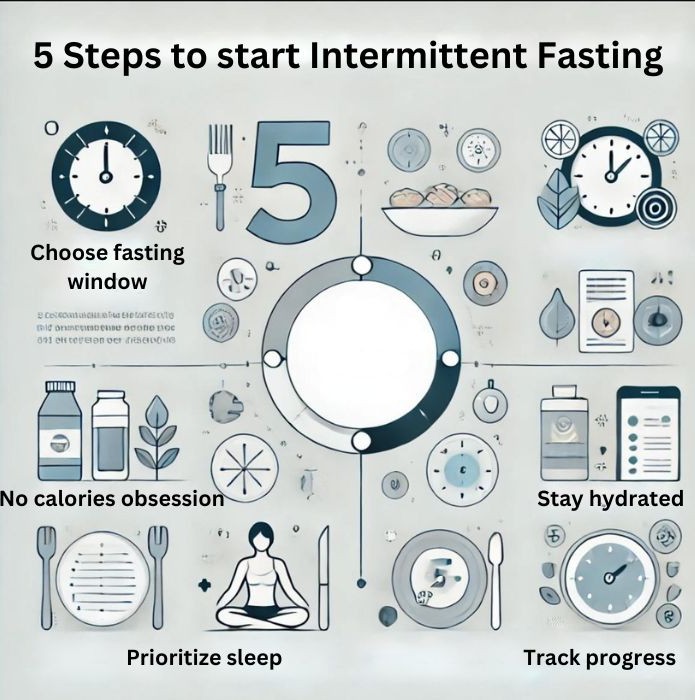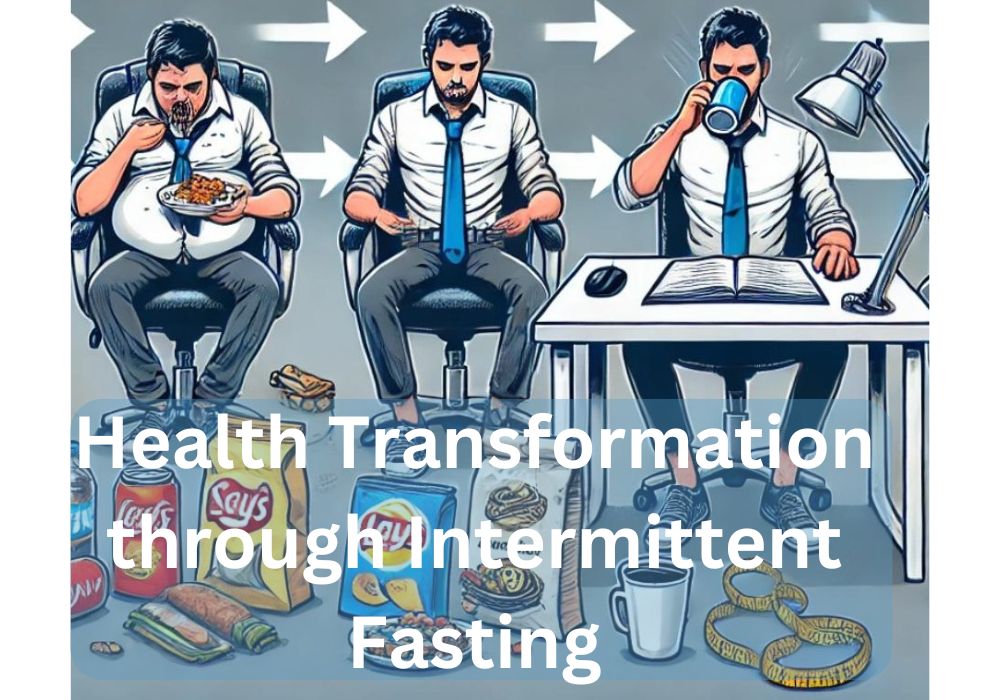Introduction
“It was 7 AM and my inbox was already exploding. By noon, I was buried in Zoom calls, still running on nothing but caffeine and adrenaline. I hadn’t eaten a bite—and oddly enough, I wasn’t even hungry. That’s when it hit me: Was I unknowingly tapping into a powerful health hack without realizing it?”
Crazy relatable, right?
If you’re a driven professional juggling endless to-do lists, health often ends up last. But what if those skipped meals aren’t a chaotic mistake—but your body’s way of nudging you into a smarter, more efficient rhythm backed by science?
What if I told you the answer to your burnout, brain fog, and stubborn weight gain isn’t in a supplement, a workout, or an expensive health app—but in not eating for a few more hours?
In this post, we’re going to break down exactly how busy professionals can transform their health with intermittent fasting, even with a packed schedule. Welcome to the world of intermittent fasting—a simple, powerful method that doesn’t require complicated meal plans, calorie counting, or even much time.
Why Intermittent Fasting Isn’t Just a Trend—It’s a Lifestyle Hack for High Performers
Let’s be real—when you hear “intermittent fasting,” you probably picture some extreme monk-like routine or a celebrity wellness fad. But take a breath—intermittent fasting (IF) isn’t about starving yourself or obsessing over every bite.
It’s structured eating. Strategic timing. A quiet rebellion against chaotic snacking and food overload. And for people like you—driven, time-starved, performance-focused—this simple shift might be the best-kept secret to feeling sharper, leaner, and more in control.
At its core, IF involves cycling between periods of eating and fasting. The most popular method? The 16:8 approach—16 hours of fasting, 8 hours of eating. That could look like skipping breakfast, eating lunch at noon, and wrapping up dinner by 8 PM.
And this isn’t pseudoscience. Research from Harvard Medical School and Johns Hopkins confirms that IF can ignite fat burning, sharpen focus, and lower inflammation—without adding more to your already jam-packed day.
Intermittent Fasting Benefits for Busy Professionals
Let’s talk real-world benefits, not just science-lingo.
Saves Time (and Mental Bandwidth)
Ever stood in front of the fridge at 7 AM thinking, “What do I even eat?” With IF, you skip that decision entirely. Fewer meals = fewer choices = less stress. It’s the ultimate productivity hack disguised as a diet.
Boosts Mental Clarity
Many professionals report sharper focus during fasting hours. That’s not placebo. According to The National Library of Medicine, fasting stimulates brain-derived neurotrophic factor (BDNF), a protein linked to cognitive performance.
Sustainable Weight Loss
Unlike fad diets, intermittent fasting aligns with your natural routine. You’re not counting calories or restricting food groups—just eating with intention. The body taps into fat reserves, helping with weight loss over time.
Stabilizes Energy Levels
No more mid-afternoon sugar crashes. IF regulates insulin levels, keeping your energy steady—perfect for powering through those 4 PM meetings.
Real Success Story: From Overwhelmed CEO to Energized Leader
Take Rahul, a 38-year-old founder of a fintech startup in Mumbai. Between investor pitches, team huddles, and midnight emails, health wasn’t even on his radar. If you’re a student or young professional aiming to boost both your academic and personal productivity, check out this guide on how to secure a travel grant for international conferences—a great resource for those balancing ambition and well-being.
Rahul stumbled upon IF through a podcast. Initially skeptical, he started small—just delaying breakfast until noon. Within two weeks, his energy improved. By month two, his sleep quality shot up, and he’d lost 5 kg without changing what he ate—only when he ate.

Is Intermittent Fasting Safe for Everyone?
While IF has many benefits, it’s important to remember that it’s not a universal solution for every lifestyle or health condition. Individuals with medical conditions like diabetes, those who are pregnant or breastfeeding, and anyone with a history of eating disorders should consult a licensed healthcare provider before starting intermittent fasting.
Similarly, if your job involves high physical labor, night shifts, or irregular routines, you may need to customize your fasting window accordingly. The goal isn’t rigid discipline—it’s flexibility and sustainability.
Start slow: Consider beginning with a 12:12 window (12 hours fasting, 12 hours eating) and gradually transition to a 14:10 or 16:8 pattern once your body is comfortable. Listen to your body’s cues—hunger, fatigue, energy spikes—and adjust accordingly.
⚠️ Disclaimer: This article is for informational purposes only and is not a substitute for professional medical advice, diagnosis, or treatment. Always seek guidance from your physician or a qualified health provider before making changes to your eating habits or health routine.
How to Get Started With Intermittent Fasting: A Busy Professional’s Guide
Choose Your Window
- Beginner: 12:12 — This means a 12-hour fasting window and a 12-hour eating window. For example, you eat between 8 AM and 8 PM. This is a gentle introduction that helps your body ease into the rhythm of intermittent fasting without feeling deprived.
- Intermediate: 14:10 — Here, you fast for 14 hours and eat within a 10-hour window. Many find this more sustainable as the benefits begin to ramp up, including better fat burning and increased focus.
- Optimal: 16:8 — The gold standard for many IF enthusiasts. Fast for 16 hours (say, from 8 PM to 12 PM next day) and eat only between 12 PM and 8 PM. This schedule maximizes metabolic benefits while fitting well into a typical workday.
Don’t Obsess Over Calories
Instead of micromanaging every bite, prioritize nutrient-dense meals during your eating window. Think grilled chicken, leafy greens, avocado, nuts, quinoa, and eggs. Occasional treats are okay too. Remember, it’s about progress, not perfection—consistency matters more than counting.
Stay Hydrated
Hydration is key to curbing hunger pangs and staying energized. Drink plenty of water throughout the day. During your fasting window, stick to zero-calorie beverages like black coffee, sparkling water, and herbal teas. These not only keep you hydrated but also support your metabolism.
Track Progress
Monitoring your fasting hours and how you feel each day builds momentum. Use apps like Zero or FastHabit to log your fasts, set goals, and review trends. Seeing progress on a graph can be incredibly motivating and help you stick with the habit.
Prioritize Sleep and Stress Management
Lack of sleep can mess with hunger hormones and trigger cravings. Aim for 7–8 hours of quality rest each night. Also, incorporate daily stress-relief rituals—like walking, meditation, journaling, or even screen-free time before bed. A calm, rested body responds better to fasting and improves overall results.

Common Myths About Intermittent Fasting—Debunked
“Skipping meals will slow down my metabolism.”
Not true. Studies show IF actually boosts metabolism temporarily and improves insulin sensitivity.
“I’ll lose muscle.”
If you’re eating enough protein and strength training during your eating window, muscle mass is preserved—and even enhanced.
“It’s just a weight loss fad.”
Intermittent fasting is backed by centuries of cultural practice (think Ramadan, Greek Orthodox fasting) and modern science alike.
How to Maximize Intermittent Fasting Benefits for Busy Professionals
Even the most well-intentioned intermittent fasting plan can fall apart during a hectic week. Here’s how to make IF work for you—regardless of how demanding your schedule may be:
Meal Prep with Purpose
Dedicate a couple of hours each weekend—ideally Sunday—to batch cook nutrient-dense meals that align with your eating window. Preparing balanced meals in advance reduces decision fatigue, ensures portion control, and increases the likelihood of staying on track.
Leverage Your Energy Peaks
Identify your cognitive high points during the day and schedule your most demanding meetings or tasks during your fasted state. Fasting has been shown to boost alertness and focus due to increased norepinephrine levels, making it the ideal time to tackle your to-do list.
Break Your Fast Intentionally
Avoid the temptation to dive into carb-heavy snacks. Instead, break your fast with protein-rich, fiber-dense foods such as eggs, legumes, or a nutrient-packed smoothie. This helps stabilize blood sugar levels and prevents insulin spikes that can lead to energy crashes.
Use Digital Tools to Stay Accountable
Set fasting start/end reminders using productivity apps like Google Calendar, or download fasting-specific trackers like Zero or FastHabit. Smartwatches can also nudge you gently throughout the day to help you maintain consistency without overthinking it.

Frequently Asked Questions About Intermittent Fasting
Q1: Can I drink coffee while fasting?
Yes! Black coffee, green tea, and herbal teas are fine. Just skip the sugar and milk.
Q2: How long until I see results?
Most people notice improved energy and sleep within 1–2 weeks. Weight loss and metabolic benefits can show within 3–6 weeks.
Q3: What if I work night shifts?
Shift your eating window to match your awake hours. The same principles still apply.
Q4: Will I feel hungry all the time?
Surprisingly, hunger often decreases over time. Your body adapts, and stable blood sugar helps reduce cravings.
Final Thoughts: How Busy Professionals Can Transform Their Health with Intermittent Fasting
In today’s fast-paced work culture, maintaining peak performance often comes at the expense of personal health. With packed calendars, back-to-back meetings, and limited downtime, nutrition and well-being can unintentionally become an afterthought. Intermittent fasting presents a practical, evidence-based framework that enables professionals to take back control—without overhauling their entire routine.
By integrating intermittent fasting into your lifestyle, you’re not just adopting another health trend. You’re building a sustainable rhythm that enhances metabolic function, improves mental clarity, and streamlines your daily decisions. From better time management to stable energy levels, IF empowers you to make intentional choices that benefit both your body and your productivity.
Whether you’re leading a team, scaling a startup, or managing multiple roles at home and work, intermittent fasting can become a cornerstone habit that supports high performance, longevity, and balance. The key is to personalize it—tailor your fasting windows, be mindful of your nutrition, and listen to your body’s feedback.
🚀 Ready to try it out? Start small. Stay consistent. Your body—and your calendar—will thank you. Just like choosing the right eating pattern can transform your health, making smart life decisions—like whether to buy or rent a house in India—can shape your overall well-being.
Liked this post? 👇
💬 Drop a comment if you’ve tried Intermittent Fasting or have questions!
🔁 Share this post with a friend who’s always ‘too busy’ to eat right!




1 thought on “How Busy Professionals Can Transform Their Health with Intermittent Fasting”
Pingback: Daily Wellness Routine: From Morning to Night – A Realistic Guide That Actually Works - SmartEduMentor